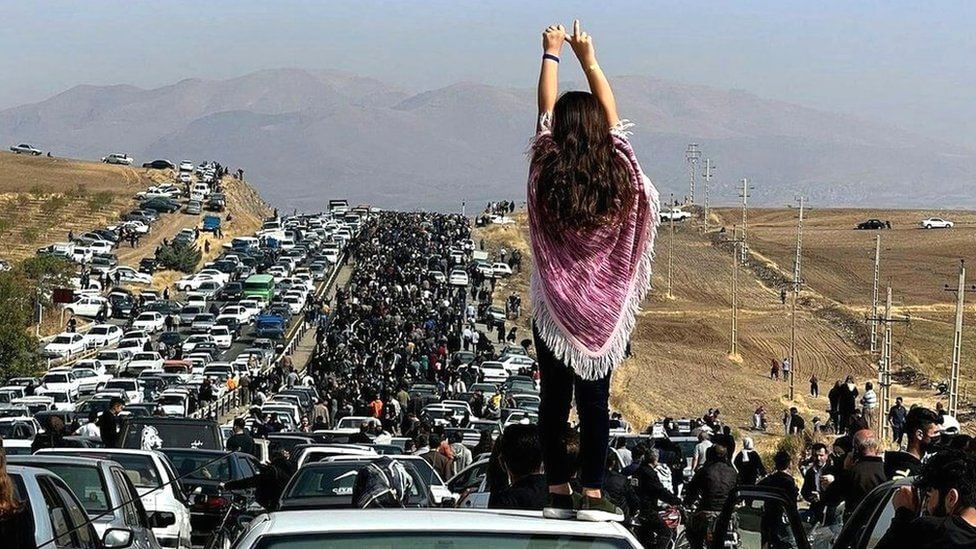On Sunday, 227 out of 290 members of the Iranian parliament called on the Judiciary to issue death sentences to all anti-regime protesters who have been arrested.
All lawmakers who have called for the drastic measure reportedly belong to the conservative bloc. Several MPs are either former Revolutionary Guard members or closely associated with the paramilitary group.
While delivering a statement in the parliament, the MPs called the protesters mohareb, which means “enemy of God” according to Sharia law. Per Islamic law, the death penalty is the punishment for being a mohareb. “We ask the judiciary to deal decisively with the perpetrators of these crimes and with all those who assisted in the crimes and provoked rioters,” they said.
14 thousand people are behind bars in #Iran for taking part in protests. Many accused of “war against God” & “corruption on earth”& facing the death penalty.Some facing revolutionary court judge in Tehran who was sanctioned by US- “the judge of death”. #MahsaAmini #مهسا_امینی pic.twitter.com/wwjpEb5IIP
— Jomana Karadsheh Scott (@JomanaCNN) November 3, 2022
The lawmakers urged the judiciary to take legal action against “the politicians who incited the rioters,” comparing them to ISIS terrorists and accusing them of “attacking people’s lives and property.”
They also claimed that the protesters are acting at the behest of the United States and other enemies of the Islamic Republic, alleging that they have received financial support and weapons from enemies of the state.
Iran's official news agency IRNA has dismissed media reports that Nasrin was killed with baton, saying she was "spending her normal life" when her family suddenly lost touch with her, and once their son-in-law broke into her place of residence in Tehran, they found her dead.
— Iran International English (@IranIntl_En) November 6, 2022
Speaker Mohammad Baqer Qalibaf, for instance, blamed US and Israeli intelligence agencies—the Central Intelligence Agency and Mossad—for instigating unrest and aiming to topple the government.
The MPs asserted that Iranian security forces have defeated forces trying to incite riots and violence within Iran, referring to the ongoing military crackdown against Kurdish groups. Iranian officials have accused the Kurdish minority of actively encouraging and supporting the protests.
🇮🇷 Islamic Republic of Iran assault on protesters:
— UN Watch (@UNWatch) November 6, 2022
314 killed
5,328 injured
14,170 arrested
🇺🇳 U.N. Human Rights Council reaction:
0 resolutions
0 emergency sessions
0 commission of inquiry
Iranian security forces have arrested tens of thousands of protesters. The Judiciary has indicted thousands of inciting riots, treason, moharebeh, corruption on earth, assembly and collusion against national security, and assaulting security forces.
Protests first erupted on 16 September in the wake of the death of a 22-year-old Kurdish woman, Mahsa Amini, who was arrested three days prior by Iran’s notorious morality police for not wearing her hijab correctly.
Powerful speech by @NazaninBoniadi at the @UN Security Council. pic.twitter.com/5EFunMo1cm
— Fardad Farahzad | فرداد فرحزاد (@FardadFarahzad) November 2, 2022
The Guidance Patrol, also known as the morality police, is a police division in charge of enforcing the Islamic Republic’s laws against immodesty and societal vices. According to reports, Amini was brutally tortured and beaten and died while receiving treatment at an intensive care unit of the Kasra hospital in Tehran.
What initially began as protests demanding an end to mandatory hijab laws have gradually morphed into a nationwide movement calling for the end of the theocracy in Iran. Protests have spread rapidly across and galvanised school and university students, including girls, labour unions, and prisoners.
Iran today beat Brazil to win the Intercontinental Beach Soccer Cup in the UAE but it was this goal celebration by Saeed Piramoon that will have people talking for a while.
— Kian Sharifi (@KianSharifi) November 6, 2022
He celebrated by "cutting" his hair in apparent support for the protests in Iran.pic.twitter.com/09M3wbG9CO
Nationwide demonstrations have continued to spread for more than 50 days. According to Iran Human Rights (IHR), at least 304 protesters, including 41 children and 29 women, have been killed in clashes with security forces. The IHR noted that protests have taken place in at least 22 provinces, with deaths recorded in 21.
The highest number of deaths have been in the Sistan and Balochistan, Mazandaran, Tehran, and Kurdistan provinces. The Sistan and Balochistan province alone saw 118 deaths, with 16 recorded deaths on Friday, the deadliest day this month.
Today, I'm proud to stand with so many around the world in solidarity with the courageous women and girls in Iran. Your protests have inspired us. pic.twitter.com/KkWRlCWReF
— Michelle Obama (@MichelleObama) October 30, 2022
Demonstrations in support of the protests have taken place across the world, including in the United States (US), Canada, the United Kingdom (UK), Greece, Sweden, Austria, France, Italy, Spain, Germany, Iraq, Lebanon, and Turkey.
The United Nations, too, has condemned Iran’s crackdown. The UN Human Rights Commission said it is “alarmed” by Iran’s use of brutal force against protesters.
Western countries like the US, Canada, and the UK have also imposed additional sanctions on Iran.
-Day 49 of Iran protests, in cities and provincial towns
— Karim Sadjadpour (@ksadjadpour) November 4, 2022
-Protests denounce @khamenei_ir and deface his image
-Unveiled female protestors are commonplace, not only in north Tehran
-Thousands mourn/march today in Fouladshahr ("Steelcity"), Isfahan province: pic.twitter.com/DqekeDuP8I
Human rights groups like Amnesty International and Human Rights Watch have also expressed deep concern over the violence against protesters and urged the UN to act urgently. “Failure to act decisively will only embolden the Iranian authorities to further crackdown,” Amnesty stated.
Iranian officials have claimed that its enemies are supporting the protests to overthrow the regime. President Ebrahim Raisi and Supreme Leader Ayatollah Khamenei have blamed the US and Israel for supporting the protests. Moreover, Iranian security officials have denied any role in Amini’s death, claiming she died due to a heart attack.

